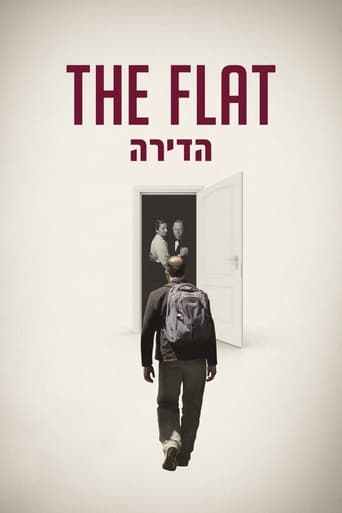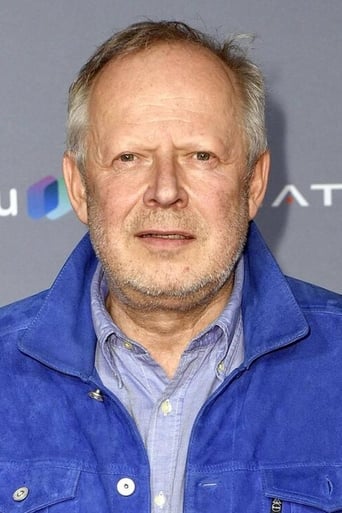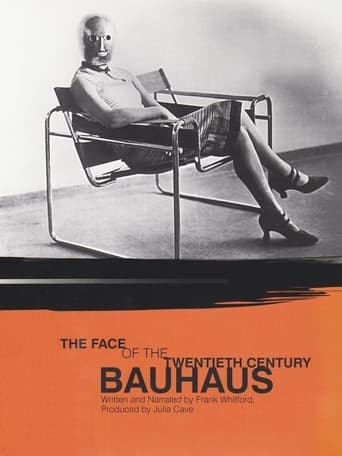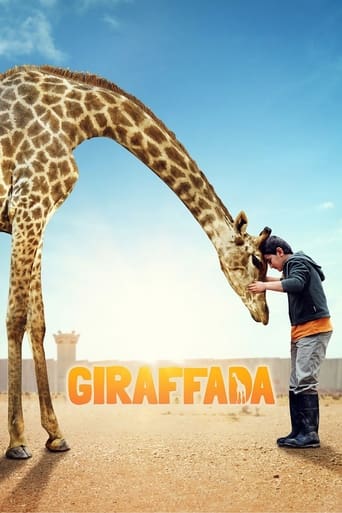

The Flat (2011)
The flat on the third floor of a Bauhaus building in Tel Aviv was where my grandparents lived since they immigrated to Palestine in the 1930s. Were it not for the view from the windows, one might have thought that the flat was in Berlin. When my grandmother passed away at the age of 98 we were called to the flat to clear out what was left. Objects, pictures, letters and documents awaited us, revealing traces of a troubled and unknown past. The film begins with the emptying out of a flat and develops into a riveting adventure, involving unexpected national interests, a friendship that crosses enemy lines, and deeply repressed family emotions. And even reveals some secrets that should have probably remained untold...
Watch Trailer
Cast


Similar titles
Reviews
Arnon Goldfinger always felt that when he went to visit his grandmother in her flat in Tel Aviv that he was going to Berlin. She had emigrated with her husband to Palestine in the 1930s. Gerda Tuchler lived a long, rich life dying at 98. Death lives a void, and it's to the living to go through a flat cluttered with things that Oma Gerda collected through a long life time. And in sifting through Gerda's papers he comes across copies of the Nazi 'Der Angriff' (Attack), featuring articles by Baron Heinrich Mildstein untitled 'A Nazi travels to Palestine'. And accompanying him were the Tuchlers. This shock sent on a long journey to lift up the veil of his grandparents hidden life. For Mildstein, it turns out, was the man who hired Eichmann, and later served in a high post in Josef Goebbels' interior ministry. And more shocking still is that even after the defeat of Nazi Germany, the Tuchlers renewed a friendship with the Mildsteins with whom they had exchanged letter until 1939 and then after the war. Not only that, they traveled to Europe, to visit them and even went on holidays in their company. And it is this mystery that Goldfinger tries to understand. His mother Hannah who was born in Germany, had forgotten the Mildsteinsl even though Gerda had kept photos of her youngest and only daughter with them. Arnon's mother turned her eyes on a new life in a new homeland, and she, too, never asked questions of her her mother life in Germany. And although 'The Flat' offers answer, and is a engrossing film, Goldfinger never really pierces the psyche of his grandparents attachment to Germany and to the Mildsteins. 'The Flat' is not an easy film, and it might make Jews in the Diaspora shrug shoulders and look down their noses at the 'Yeckers', the not so Yiddish term for German Jews whom they thought looked at the world from a superior regard.
I had never heard of this film as we don't get many documentaries in our area and if it was shown at a Jewish film festival, it would have eluded me. Although this is a documentary focused on the holocaust, primarily whet I took away; is that there are people who want to be realists and deal with the truths of their own and the lives of others and there are those who live lives of denial. It is my opinion that the second type of people actually endanger not only themselves but those they may love very much.I knew people who themselves had been in camps or were the children of those who had been, but I had never stopped to consider the "lapping" over of lives of those who had been persecutors and persecuted. And of course there must be many such instances of this.Many people on the message boards have criticized Aron Goldfinger for confronting the daughter, Edda, of the Von Mildensteins. But why should he not have done so? She said her father was traveling in Japan during the war, but did his grandparents receive any letters from his travels then? I was sort of disgusted with both husband and wife in that situation. that the camps had been Russian and American propaganda, I am roughly the same age as Hannah and Edda and believe me I would have known if all the Jewish children in my school had disappeared. What do they think happened to those people. Where are all the other Arons that should have populated Germany? They never got born because there parents died in the camps.Through one of those odd twists of fate I became involved in a correspondence with a woman whose parents had been very prominent in Hitlar's Nazi Germany. When it was found that one of the couple were not completely Aryan they had to leave Germany and settled with their large family in the town I now live in. When I first heard from one of these children I did research in the newspaper archives here, and like Edda my correspondent was very desirous of explaining away her parents involvement in events that took place in Germany.We here in the United States are supposed to continue to feel guilty about the fact that this country once allowed slavery. No one alive today owned a slave here, and many are descended from people who did not even live in America during slave owning years. But there are many in Germany who lived though those years of 1930 and 1940 and who claim to have no knowledge of anything unpleasant that happened, except to themselves. As we learn Edda and her husband had spent many years living in England.My husband and I are both very pleased that we saw this wonderful documentary and we both liked Aron very much.
'Compartmentalization' is a type of psychological defense mechanism where a person has very conflicting values and/or behaviors and keeps them separate in their mind in order to avoid discomfort. An example would be a man who beats his wife and kids and yet otherwise appears to be a pillar of the community. While the term is never used in "The Flat", compartmentalization is a HUGE theme throughout this very unusual film.Aron Goldfinger made this documentary (using simple equipment) about his grandparents. It seemed when his grandmother died in her late 90s, the family began taking all of the old woman's things out of the apartment she had shared with her husband for many years in Tel Aviv, Isreal. During this process, something very strange turned up--a collection of photos and correspondences between the grandparents (the Tuchlers) and the von Mildensteins back in Germany. What made this so strange? Well, the Tuchlers were Jews who left Germany to avoid the Holocaust and Mr. von Mildenstein was a high Nazi official! In fact, although his own family today didn't know it (they thought he was a reporter), von Mildenstein actually hired Adolf Eichmann (one of the major architects of the 'final solution') and later worked for Josef Goebbels' Propaganda Ministry--and yet, as I said above, the Tuchlers and von Mildensteins remained friends and even visited each other in the years AFTER WWII! Yet, Mrs. Tuchler's own mother was killed by the Nazis! Wild, weird and a bit sad---this is a very unusual film that will pique your curiosity. Overall, a very intriguing little film indeed!
Arnon Goldfinger's most recent documentary The Flat (best documentary awards at the Jerusalem and Haifa film festivals) starts as a typical family story. A few weeks after the director's grandmother dies the family starts looking into the things accumulated in her Tel Aviv flat. The apartment is full of objects gathered through a full life, and as it gradually empties and light starts penetrating the shady corners, details from a hidden past start to emerge. As many other immigrants coming from Europe Gerda and Kurt Tuchler had gathered not only things from a past time and an old country, but also photos and documents of a life that brought them from the Berlin between the two wars to Palestine which was to become the State of Israel. Soon we learn that the Tuchlers seemed to be the kind of immigrants who kept not only memories and nostalgia, but a strong attraction and relationship with the old country. An intriguing story completely unknown to the third generation starts to uncover from the drawers and boxes left in the flat – photos, letters, newspapers from Nazi Germany and one of the strangest coins that ever existed, with a Magen David on one side and a swastika on the other. The Tuchlers were friends with a family of high Nazi dignitaries named von Mildenstein, they traveled with them to Palestine after the Nazis came to power and before settling here definitively, and the trip was described in details by Leopold von Mildenstein in the German press of the time under the title 'A Nazi travels to Palestine'. Despite the fact that the story was researched and mentioned in the German and Israeli press after the war, the family knows close to nothing about it. The film describes the process of gradual discovery which is not void of surprises, as they soon learn that the Tuchlers and the Mildensteins continued their friendly relations after the war, despite the fact that von Mildenstein seemed to have been quite an important figure in the Nazi regime, and related to the fate of the Jews (he was the one who recruited Eichman and preceded him in the position of responsible of the Jewish affairs). How much the Tuchlers knew about the activities of their German friend during the war and what these really were remains in part a mystery.The film focuses on the process of gradual discovery which is for the author-director a trip in the past of his own family, a trip which will take him to Germany, to Berlin where he discovers remote relatives still living in the same area where his grandparents lived and to a series of meetings with the daughter of the Mildensteins. Dialogs between German and Jewish families who lived through the war and between their descendants are never easy, and they say a lot about how people who lived through the period relate to history, how they cope with the horrors of the war and of the Holocaust and how they passed these feelings to the coming generations. A strong similarity soon emerges, as in both families, the German one and the Jewish one, the same rule of silence seems to have been enforced, the past was kept secret and almost nothing told to the next generation. The children were raised not to ask questions, and their lives were completely disconnected from the history of their families. During Goldfinger's inquiry and film making both families are up for painful revelations and none of the second generation is really prepared to cope with role played by the high German functionary in the Nazi regime, or with the fate of the Jewish grand-grandmother left behind in Berlin and murdered in the Holocaust. It is the third generation (of the director) who is destined to ask the questions and get part of the answers. The mystery of the Tuchlers is not fully revealed and will probably never be completely. In one of the final scenes of the film the director and his mother are looking under a pouring rain for the grave of the grand-grandfather in a Jewish cemetery in Berlin. They cannot find it, the place where it should be is covered by vegetation. The physical link with the past has completely vanished. The spiritual link of the old generation who could not tear themselves from the cultural and mentality relation with the old Europe even after the horrors of the Holocaust is the troubling secret investigated and revealed in part by this documentary.





